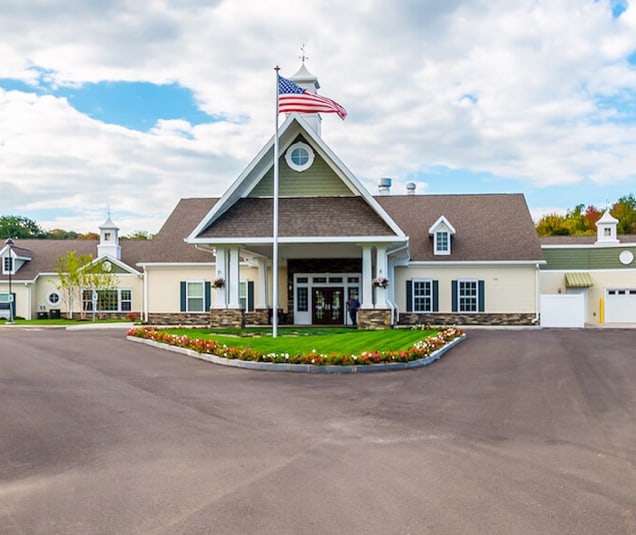Dementia can be a tricky condition, often leading to the need for a higher level of care than found in some types of assisted living. Fortunately, when a loved one is diagnosed with dementia, memory impairment, or any other type of cognitive decline, there’s an answer: memory care. But what is memory care for dementia?
Memory care is a specialized type of senior living where older adults with dementia receive tailored treatment to address the unique difficulties caused by the condition. In memory care, your loved one lives in an environment designed for their needs. There are programs to encourage cognitive stimulation, trained caregivers, medical support, and more.
What Is Dementia?
Dementia isn’t a single disease, but an umbrella term for a group of symptoms that affect cognitive abilities. While the natural aging process often causes occasional forgetfulness, dementia is more severe. Brain cells are damaged, which causes a noticeable decline in memory, thinking, reasoning skills, and more.
Alzheimer’s disease is the most common type of dementia, accounting for roughly 60-80% of all cases. There are many other types, including:
Dementia Signs & Symptoms
While each type of dementia varies slightly in how it affects a person, each condition leads to the eventual damage, or death, of cells in the brain. Eventually, this leads to:
- Memory loss ranging from forgetting recent events to difficulty remembering familiar people and places
- Difficulty concentrating or completing familiar tasks
- Problems with language, communication, and understanding
- Disorientation, including confusion about time and place or getting lost in familiar surroundings.
- Poor judgment, such as making risky decisions about hygiene or safety
- Changes in mood and personality
These symptoms are progressive, getting worse with time. Eventually, they lead to the need for professional care—like that offered within a memory care community.
What Is Memory Care?
Memory care is a type of long-term senior care that caters to the unique needs of people with Alzheimer’s disease or other forms of dementia. It’s typically provided in a residential community so your loved one can receive proper care in a home-like environment that is safe, supportive, and secure.
Unlike other forms of senior living, memory care creates a customized treatment plan to suit your loved one’s unique capabilities and needs. This plan adjusts as your loved one’s needs change so they’ll always receive the correct level of care.
There are extra safety measures throughout memory care communities as well, ensuring your loved one can stay safe and secure while receiving the care they need.
With a wide range of programs, therapies, activities, and amenities, memory care aims to improve a person’s quality of life by keeping them engaged and supported—all while offering round-the-clock supervision and attention when needed.
The Benefits of Memory Care
Memory care can be an excellent way to get your loved one proper care and support. These communities aren’t just about providing a home for your loved one, they’re designed to improve their quality of life while providing customized support.
Caring Teams
The teams in memory care are trained to handle the unique needs and behaviors of individuals with dementia. They’re equipped to de-escalate challenging situations and provide the level of care necessary to keep your loved one safe and comfortable.
Simple Layout
The physical layout of memory care units is designed to be easy to navigate, with cues to help residents find their way around. Since dementia can often cause habits like disorientation or getting lost, the environment itself is designed to reduce feelings of anxiety and make it easier to move about. The rooms are often smaller and more home-like, which can be less overwhelming.
Supportive Programs
While your loved one lives in memory care, they gain access to therapeutic programs designed to reduce cognitive decline and improve their quality of life. These programs are designed to keep residents engaged socially and cognitively, which can help build a sense of connection with the people around them.
By moving your loved one to memory care, you can positively impact their lives. In this nurturing environment, they can receive the care they need from a team of trained, loving, and supportive professional caregivers.

Is It Time for Memory Care?
How can you tell if it’s time for memory care? Dementia often showcases itself with moments of memory loss, forgetfulness, and confusion—all symptoms that can be mistaken for natural age-related changes in the brain. However, there are several symptoms to watch out for that might indicate something is wrong:
- Your loved one is beginning to become disoriented, get lost, and have difficulty navigating their environment.
- There are noticeable changes in their hygiene or personal care routines, suggesting they struggle with daily tasks.
- They become increasingly agitated, aggressive, or confused, especially in the late afternoon or evening.
- There are significant shifts in mood or personality, such as increased anxiety, paranoia, or depression, which are out of character for them.
- There is a decline in their ability to communicate effectively, including trouble finding the right words or following conversations.
If you’ve noticed any of these signs in your loved one, it’s time to consider a move to memory care.
Memory Care in Syracuse
If you think your loved one can benefit from a move to memory care, reach out to our team at Peregrine Senior Living at Onondaga Hill. Our team of caregivers is here to give them the care and support they deserve. Don’t wait for dementia to progress—schedule a visit with our community today.












Lots of smiles today at Onondaga Hill with making our snowmen and adding some individual art to each one. Our residents enjoyed themselves with this Creative Craft and check out all of them on display on our fireplace mantel. ... See MoreSee Less
0 CommentsComment on Facebook
Lots of smiles from our community members and their family members this afternoon as we listened to the sweet sounds of Meg Mawhinney!! We also enjoyed some delicious snacks and the warmer weather. ... See MoreSee Less
3 CommentsComment on Facebook
A new year means new beginnings, and for many, that includes finding a place that feels like home. 🏠❤️
Our community offers the perfect blend of comfort, engagement, and care. Whether you’re looking for a vibrant social lifestyle or the peace of mind that comes from knowing support is always nearby, you’ll find it here.
Schedule your tour today and see how life at Peregrine can help you or your loved one thrive in 2026 and beyond!
peregrineonondaga.com/ ... See MoreSee Less
0 CommentsComment on Facebook
As we turn the page to a new year, we take a moment to reflect on the memories we’ve made and the friendships we’ve built. Every new beginning brings fresh opportunities for connection, growth, and joy. 💫
Here’s to a year filled with purpose, peace, and the beautiful moments that remind us how wonderful life can be.
Happy New Year from all of us at Peregrine! 🎆
peregrineonondaga.com/ ... See MoreSee Less
0 CommentsComment on Facebook
Community, collaboration, and care 💫
Loved spending time at our Constant Care 24/7 monthly meeting at Park Rose with some of our favorite partners, Peregrine Senior Living at Onondaga Hill , Aging Advocates CNY , and Living With Dementia CNY 💜 ... See MoreSee Less
0 CommentsComment on Facebook
We made and decorated our own Christmas Cookies on Christmas Eve!!. Loved the creative ideas our community members displayed in their artwork. The best part is they ate them for a delicious snack!!! ... See MoreSee Less
0 CommentsComment on Facebook
Wishing you a Christmas filled with the simple joys that matter most: love, laughter, and time spent with those who make life meaningful! 💌
Within our Peregrine communities, the holiday spirit comes alive through shared meals, cherished traditions, and the connections that make every day feel like home.
From our family to yours, Merry Christmas and blessings for the season ahead.
peregrineonondaga.com/ ... See MoreSee Less
1 CommentsComment on Facebook